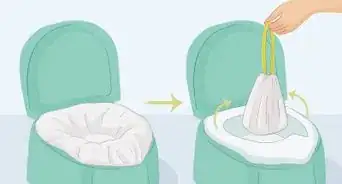This article was co-authored by Wits End Parenting and by wikiHow staff writer, Jessica Gibson. Wits End Parenting is a parent-coaching practice based in Berkeley, California specializing in strong-willed, “spirited” children with impulsivity, emotional volatility, difficulty “listening,” defiance, and aggression. Wits End Parenting's counselors incorporate positive discipline that is tailored to each child’s temperament while also providing long-term results, freeing parents from the need to continually re-invent their discipline strategies.
There are 8 references cited in this article, which can be found at the bottom of the page.
This article has been viewed 221,154 times.
Do you ever wish you knew how to be more patient with kids? If you're like most parents, the thought probably crosses your mind a few dozen times a day. The good news is that while no one is perfect and calm all the time, you're already taking the first step by reading this article! If you're ready to develop these skills, keep reading for practical suggestions.
Things You Should Know
- Practice ways to calm yourself when you start to lose patience. Take deep breaths, relax your muscles, or get some alone time.
- Work on effective communication with your kids and define expectations and boundaries to help prevent frustration and impatience.
- Focus on what triggers your impatience and avoid your triggers—expect that kids will push your buttons and choose how you'll react.
Steps
Expert Q&A
-
QuestionHow can I be patient with my kids?
 Wits End ParentingWits End Parenting is a parent-coaching practice based in Berkeley, California specializing in strong-willed, “spirited” children with impulsivity, emotional volatility, difficulty “listening,” defiance, and aggression. Wits End Parenting's counselors incorporate positive discipline that is tailored to each child’s temperament while also providing long-term results, freeing parents from the need to continually re-invent their discipline strategies.
Wits End ParentingWits End Parenting is a parent-coaching practice based in Berkeley, California specializing in strong-willed, “spirited” children with impulsivity, emotional volatility, difficulty “listening,” defiance, and aggression. Wits End Parenting's counselors incorporate positive discipline that is tailored to each child’s temperament while also providing long-term results, freeing parents from the need to continually re-invent their discipline strategies.
Parenting Specialists Try not to overstress about everything they do. If they can handle a situation on their own, let them try to figure out and help them if they need to.
Try not to overstress about everything they do. If they can handle a situation on their own, let them try to figure out and help them if they need to.
References
- ↑ https://www.psychologytoday.com/us/blog/liking-the-child-you-love/201505/three-ways-be-more-patient-parent
- ↑ https://www.fatherly.com/love-money/stop-being-impatient
- ↑ https://kidshealth.org/en/parents/temper.html
- ↑ https://sesamestreetincommunities.org/activities/feelings-have-names/
- ↑ https://www.psychologytoday.com/us/blog/peaceful-parents-happy-kids/201706/how-and-when-apologize-your-child
- ↑ Wits End Parenting. Parenting Specialists. Expert Interview. 5 March 2020.
- ↑ https://www.fatherly.com/love-money/stop-being-impatient
- ↑ Wits End Parenting. Parenting Specialists. Expert Interview. 5 March 2020.
- ↑ https://kidshealth.org/en/parents/nine-steps.html







































































Medical Disclaimer
The content of this article is not intended to be a substitute for professional medical advice, examination, diagnosis, or treatment. You should always contact your doctor or other qualified healthcare professional before starting, changing, or stopping any kind of health treatment.
Read More...